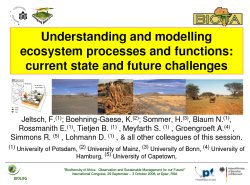|
|
|
 |
|
|
Presentation
< back to presentation overview
| Details of the presentation |
| Presentation |
Oral presentation |
| Title |
Summary and vision: Understanding and modelling ecosystem processes and functions: current state and future challenges
|
| PDF Download |
 Download PDF (Filesize 3.7 MB)
Download PDF (Filesize 3.7 MB)

|
| Short title |
Modelling ecosystem processes and functions
|
| Author(s) |
Jeltsch, F.(1); Boehning-Gaese, K.(2); Sommer, H.(3); Blaum, N.(1); Rossmanith, E.(1); Tietjen, B.(1); Meyfarth, S.(1); Groengroeft, A.(4); Simmons, R.(5); Lohmann, D.(1) et al.
|
| Presenting author |
Jeltsch, Florian
|
| Institution(s) |
(1) Plant Ecology and Nature Conservation, University of Potsdam, Germany; (2) Community and Macroecology Group, Department of Ecology, Johannes Gutenberg-University Mainz, Germany; (3) NEES-Institute for Biodiversity of Plants, Bonn, Germany; (4) University of Hamburg, Institute of Soil Science, Germany; (5) Namibia Nature Foundation, Namibia, & FitzPatrick Institute, University of Cape Town, South Africa.
|
| Keywords |
Mechanistic models, statistical models, macroecology, experiments, global change, mangement tools, sustainable use, eco-hydrology
|
| Abstract |
Eight years of coordinated BIOTA research on processes and mechanisms driving biodiversity dynamics in different African ecosystems have significantly contritubed to a mechanistic understanding of ecosystem functioning. This mechanistic understanding of complex, interacting processes at different spatial and temporal scales is a crucial prerequisite for the development of tools for sustainable future use and management of biodiversity in these fragile systems. Several of such tools have already been successfully developed in different BIOTA subprojects based on the linkage of empirical findings with advanced methods in statistical and process-based modelling. While most present research results and tools focus on past and present situations or only consider specific aspects of future developments key challenges remain in the field of Global Change. In particular combined effects of future climate, land use and other changes (e.g. CO2) are expected to lead to extremely complex responses in the abiotic and the biotic world covering a variety of scales and organisational levels. Given this complexity we will need ongoing monitoring and more specific well-designed experiments in combination with advanced statistical and mechanistic models to further improve our capability to develop realistic scenarios of future trends in biodiversity, ecosystem functions and services.
Based on a brief summary of BIOTA research highlights we will present research avenues to process-based tools that will contribute to the sustainable management and use of natural ressources under Global Change. This includes approaches to mitigate negative effects of climatic changes by adapted land use measures and the explicit linkage of the management of biotic and abiotic key ressouces (e.g. biodiversity and water availability).
|
| Congress Topic |
Process Analysis
|
| Topic No. |
2.11 |
| Notes |
|
| Ref. No. |
542 |
|
|
|
